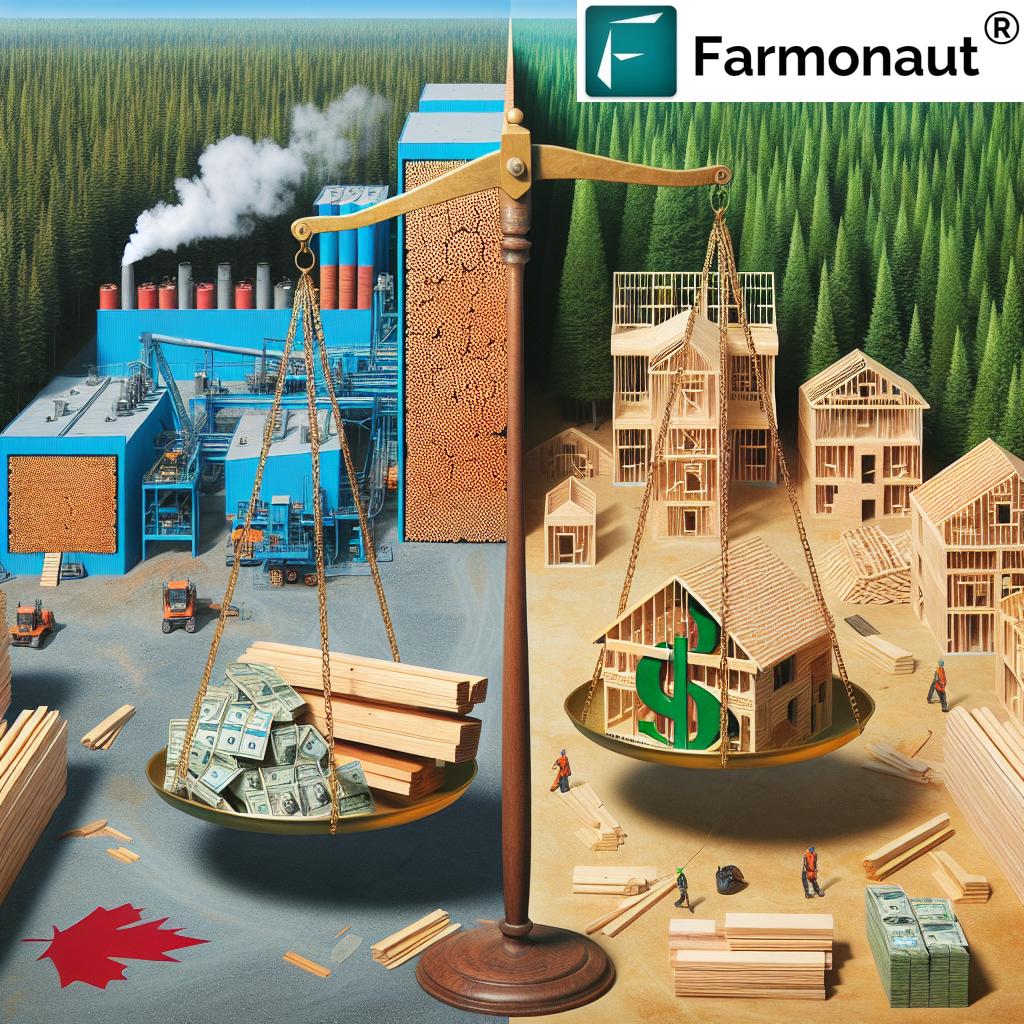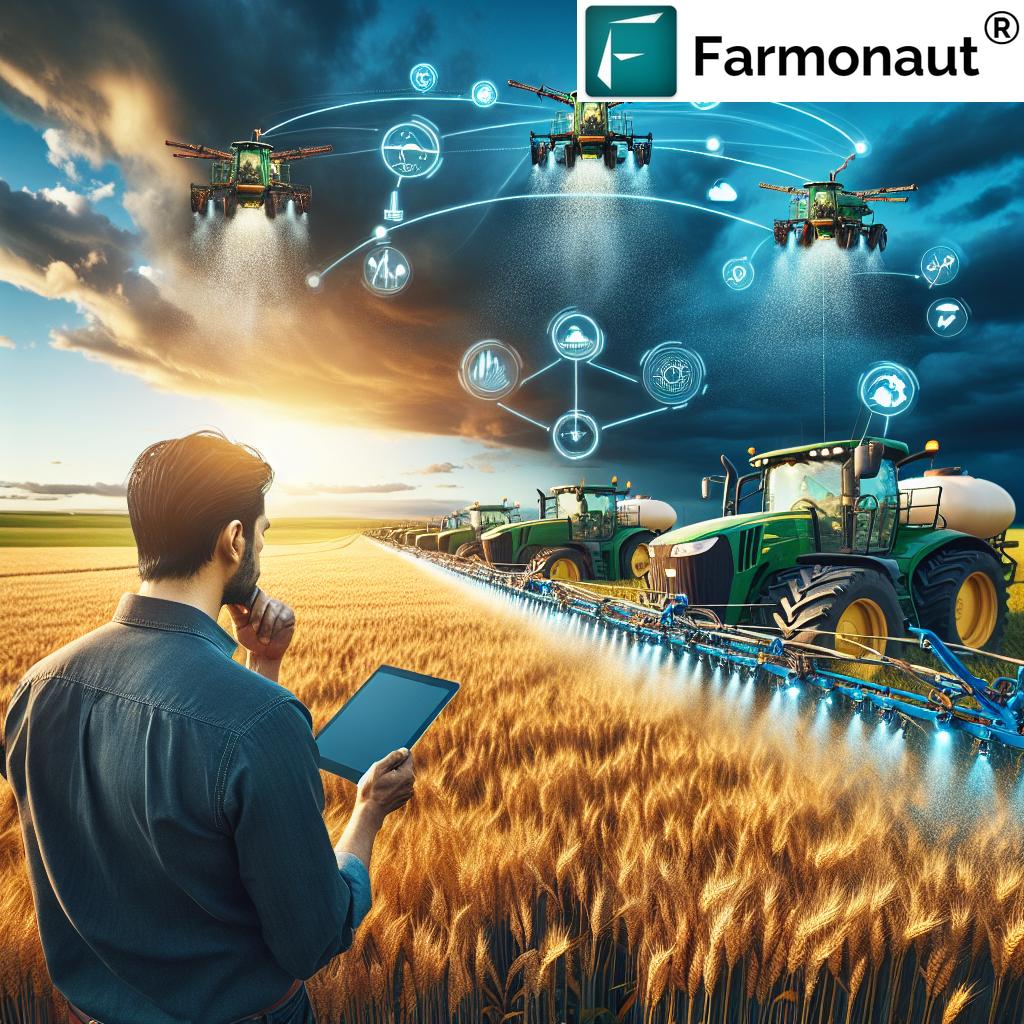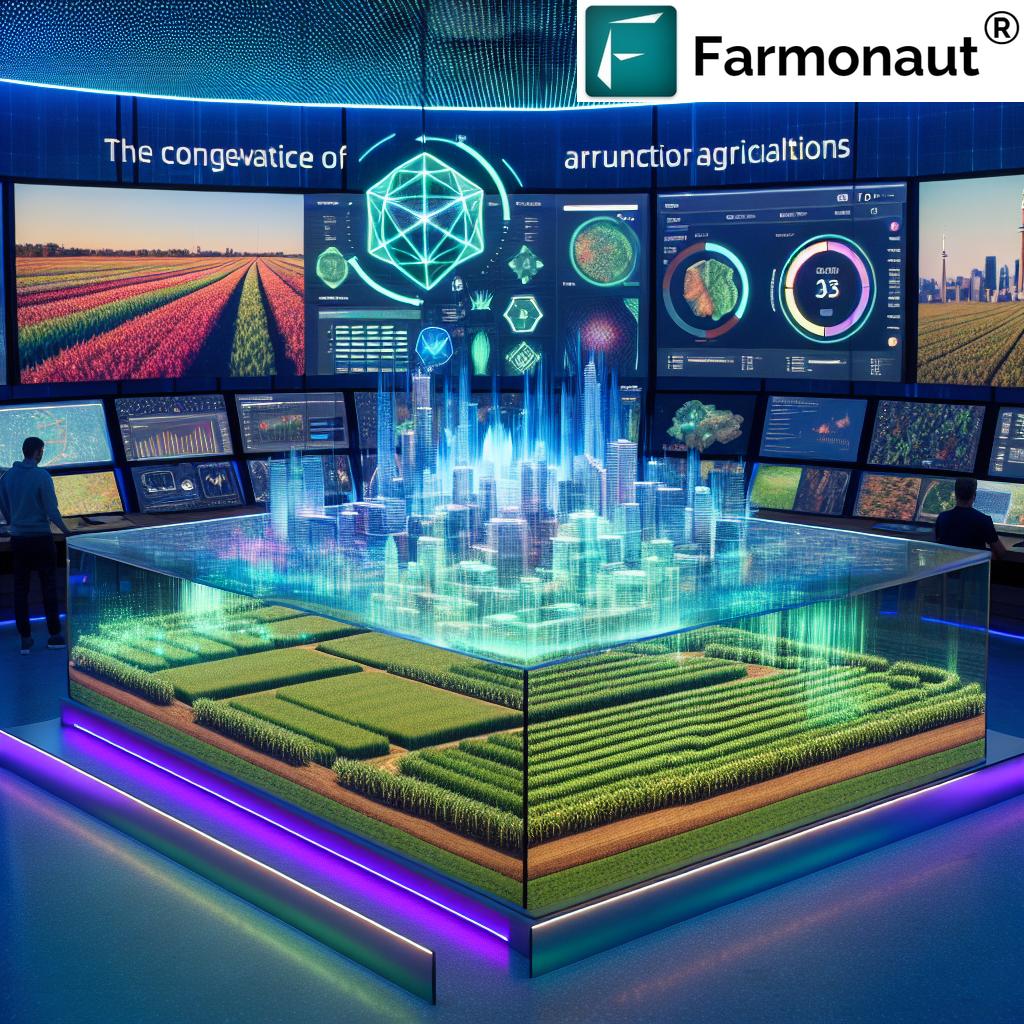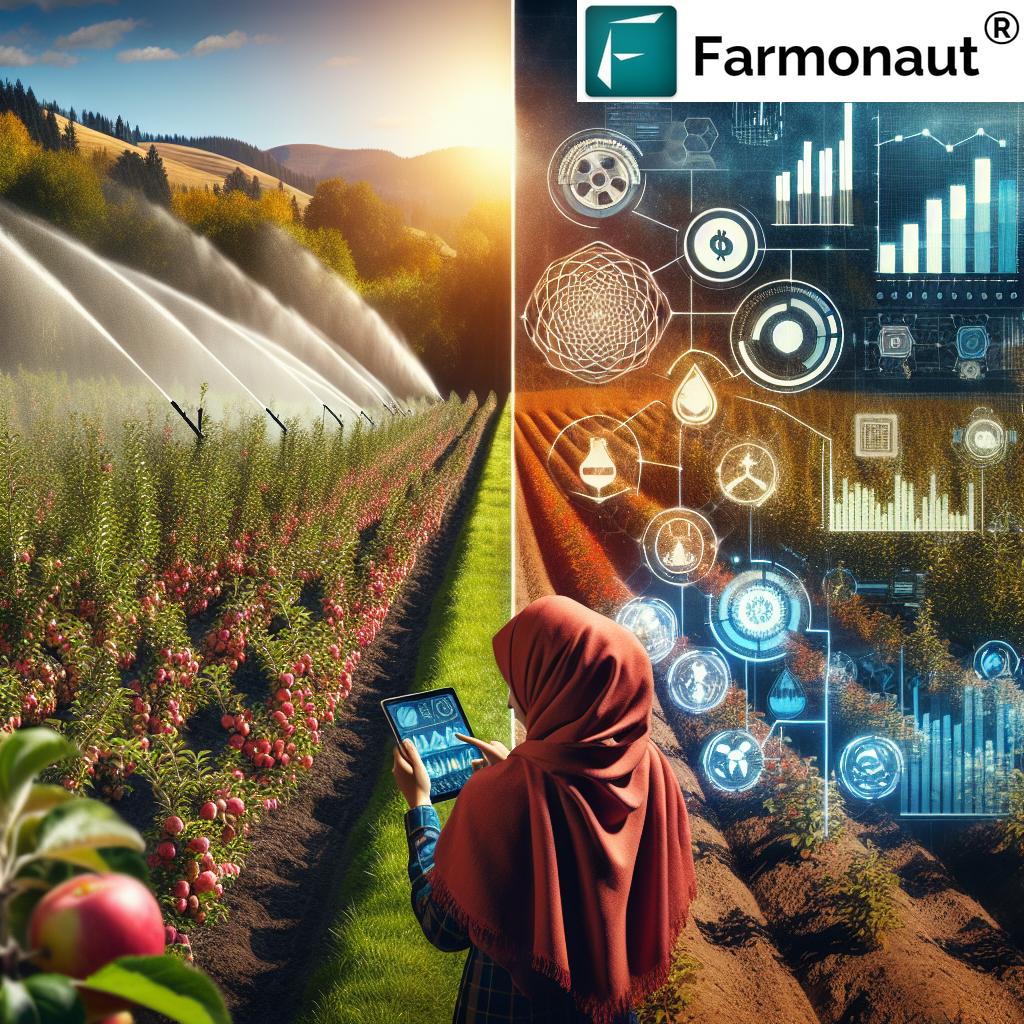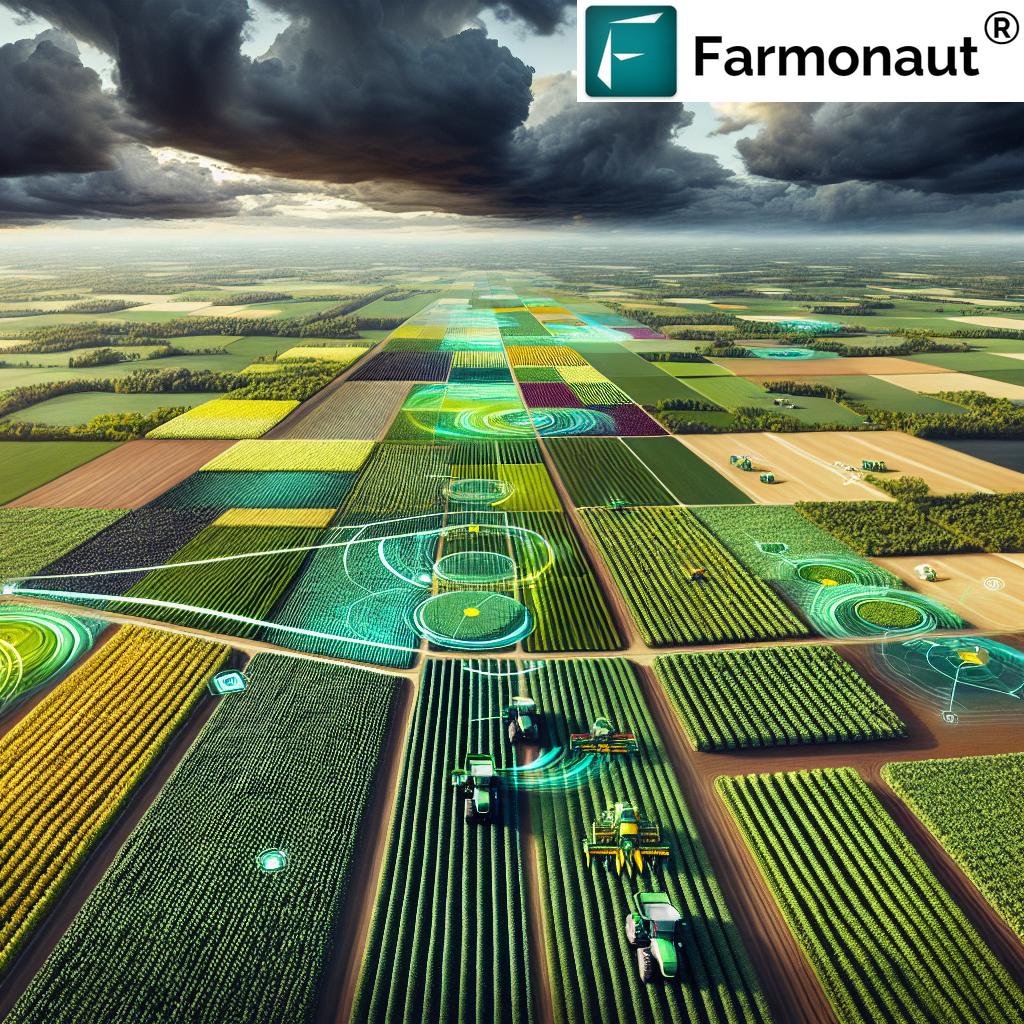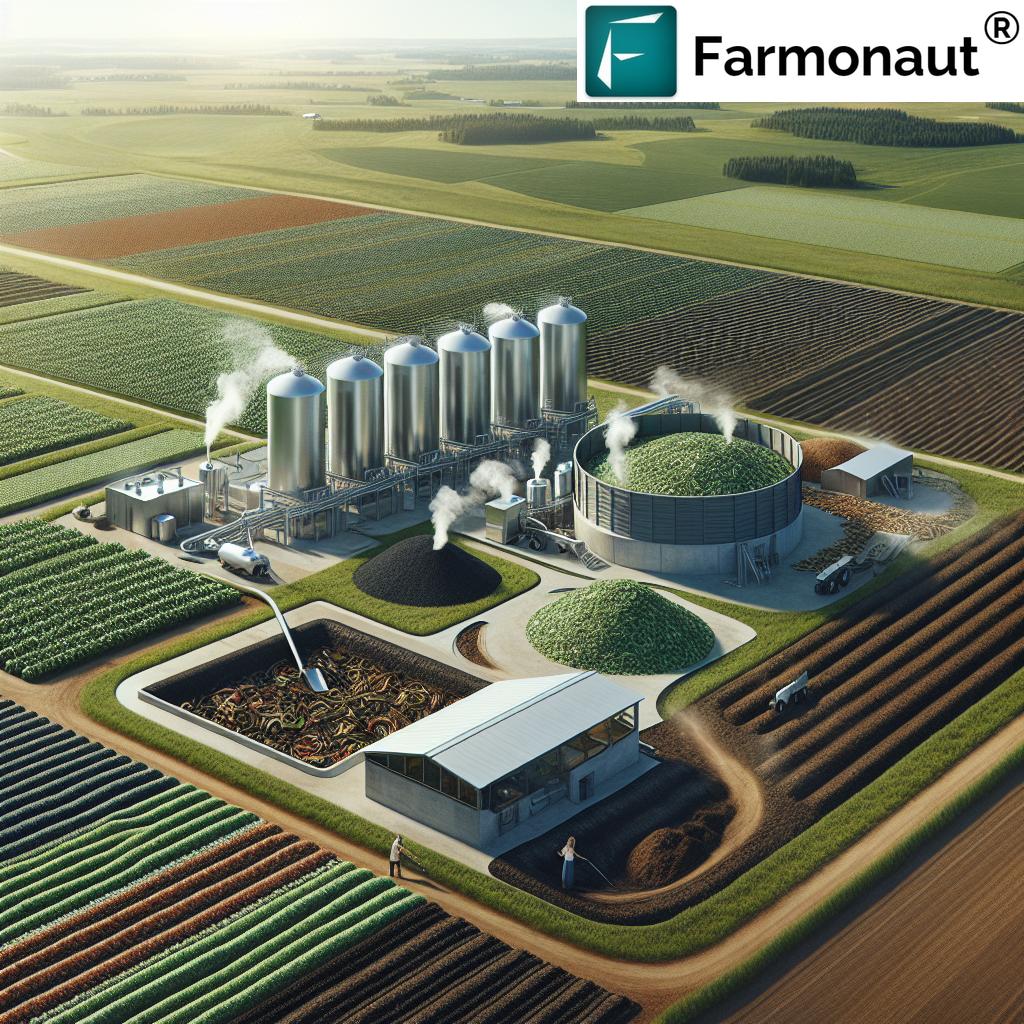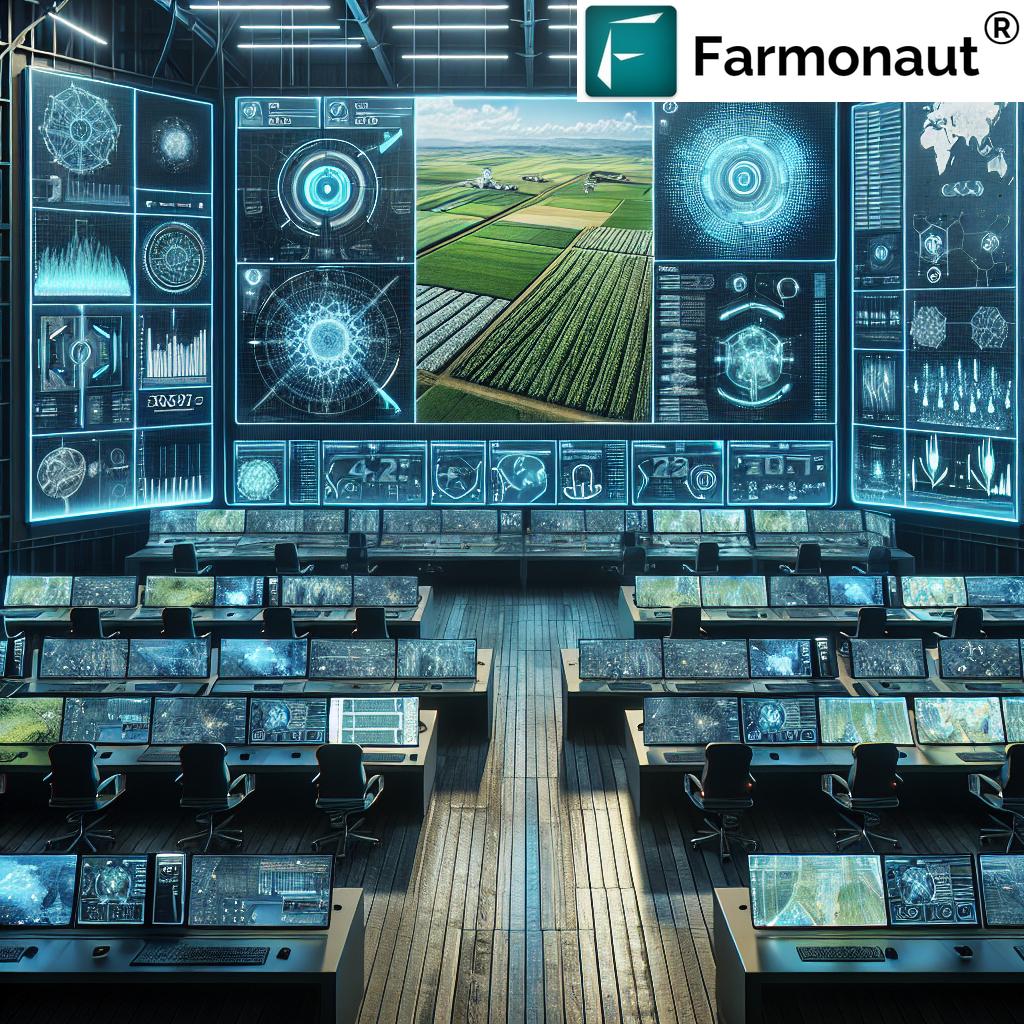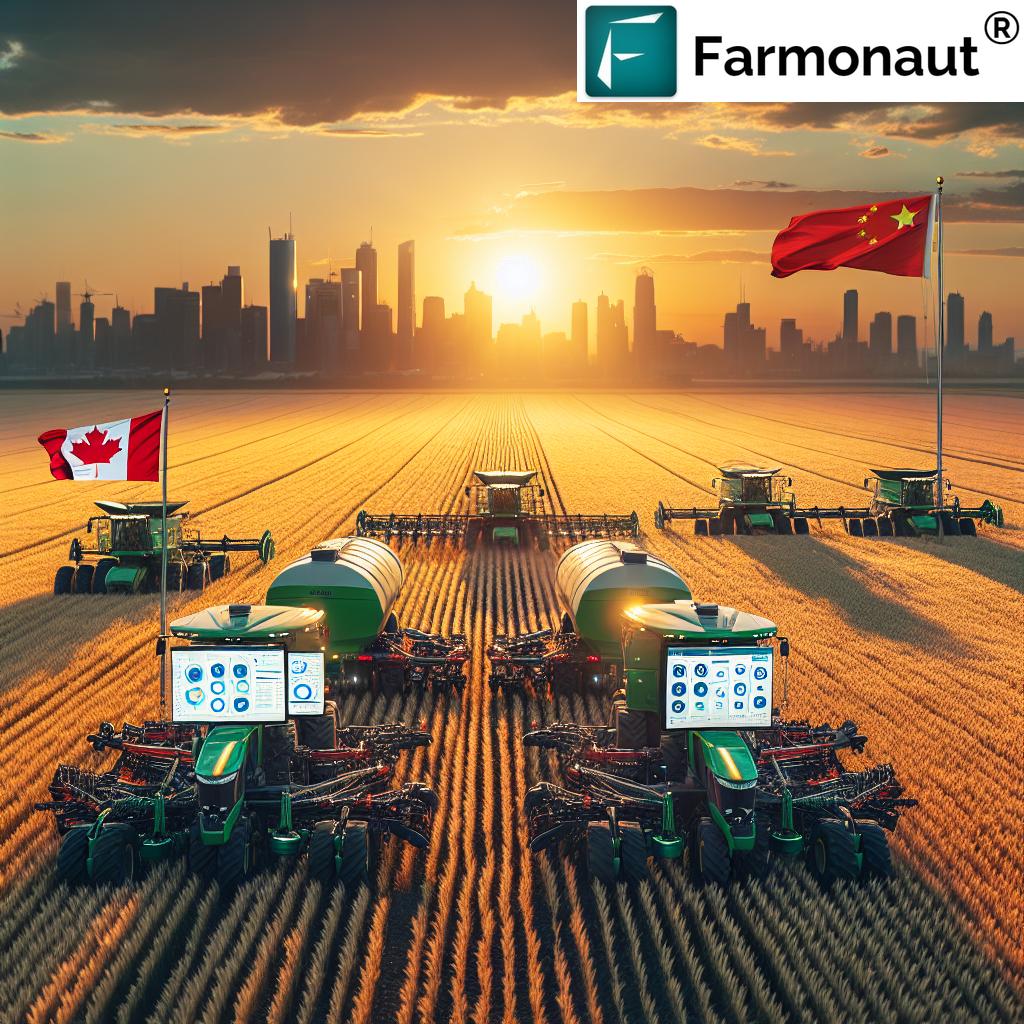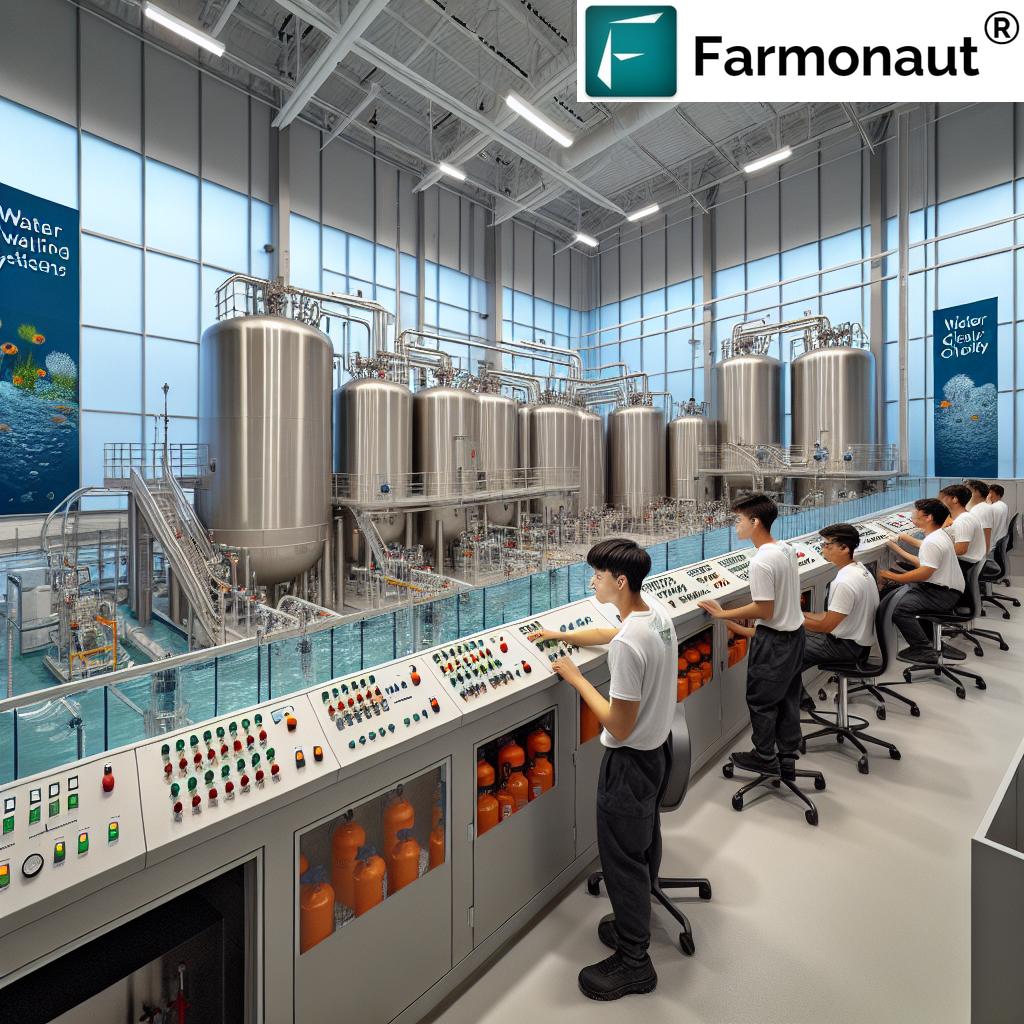Revolutionizing Canada’s Agri-Food Sector: How AI and Precision Agriculture Are Transforming Sustainable Food Production
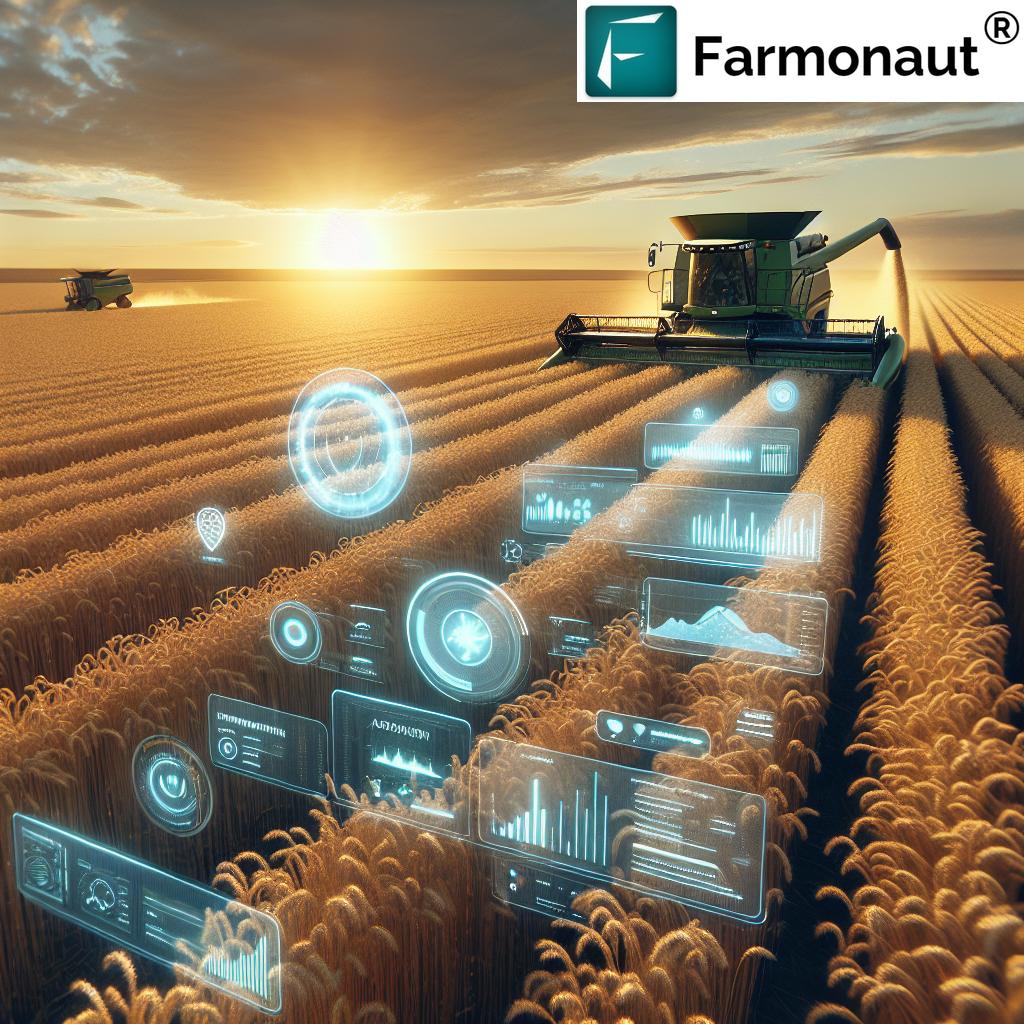
“AI-powered precision agriculture can reduce agricultural waste by up to 20% while increasing crop yields by 15%.”
In the heart of Canada’s vast agricultural landscape, a revolution is taking root. We are witnessing the dawn of a new era in sustainable food production, where artificial intelligence (AI) and precision agriculture technologies are transforming the way we grow, process, and distribute food. This groundbreaking initiative is not just about increasing yields; it’s about reshaping the entire agri-food value chain to meet the challenges of the 21st century.
As we delve into this exciting transformation, we’ll explore how innovative agtech solutions, including those provided by companies like Farmonaut, are playing a crucial role in this agricultural renaissance. From data-driven farming practices to enhanced food supply chain transparency, these advancements are setting new standards for efficiency, quality, and sustainability in Canada’s agri-food sector.
The Power of Precision Agriculture Technologies
Precision agriculture is at the forefront of this agricultural revolution, leveraging cutting-edge technologies to optimize every aspect of farming. Let’s explore some of the key components driving this change:
- Satellite Imagery Analysis: Advanced satellite technology provides farmers with a bird’s-eye view of their fields, offering insights into crop health, soil moisture, and potential issues before they become visible to the naked eye.
- IoT Sensors: A network of Internet of Things (IoT) devices scattered across fields collects real-time data on soil conditions, weather patterns, and crop growth stages.
- Machine Learning Algorithms: These sophisticated AI tools process vast amounts of agricultural data, generating actionable insights and predictive models to guide farming decisions.
- Drone-based Monitoring: Unmanned aerial vehicles equipped with multispectral cameras offer high-resolution imagery for precise crop management and early detection of pests or diseases.
These technologies work in concert to create a data-rich environment that empowers farmers to make informed decisions, optimize resource use, and maximize yields while minimizing environmental impact.
AI in Agriculture: A Game-Changer for Sustainable Food Production
Artificial Intelligence is revolutionizing agriculture in Canada, offering unprecedented opportunities for sustainable food production. Here’s how AI is making a difference:
- Crop Yield Optimization: AI algorithms analyze historical data, weather patterns, and soil conditions to predict optimal planting times and crop rotations, significantly boosting yields.
- Precision Resource Management: By analyzing data from IoT sensors and satellite imagery, AI systems can recommend precise amounts of water, fertilizers, and pesticides needed for each part of a field, reducing waste and environmental impact.
- Automated Pest and Disease Detection: Machine learning models can identify early signs of crop diseases or pest infestations, allowing for targeted interventions that minimize chemical use.
- Predictive Analytics for Supply Chain Management: AI-powered forecasting helps optimize harvesting schedules, storage, and distribution, reducing food waste and improving overall efficiency.
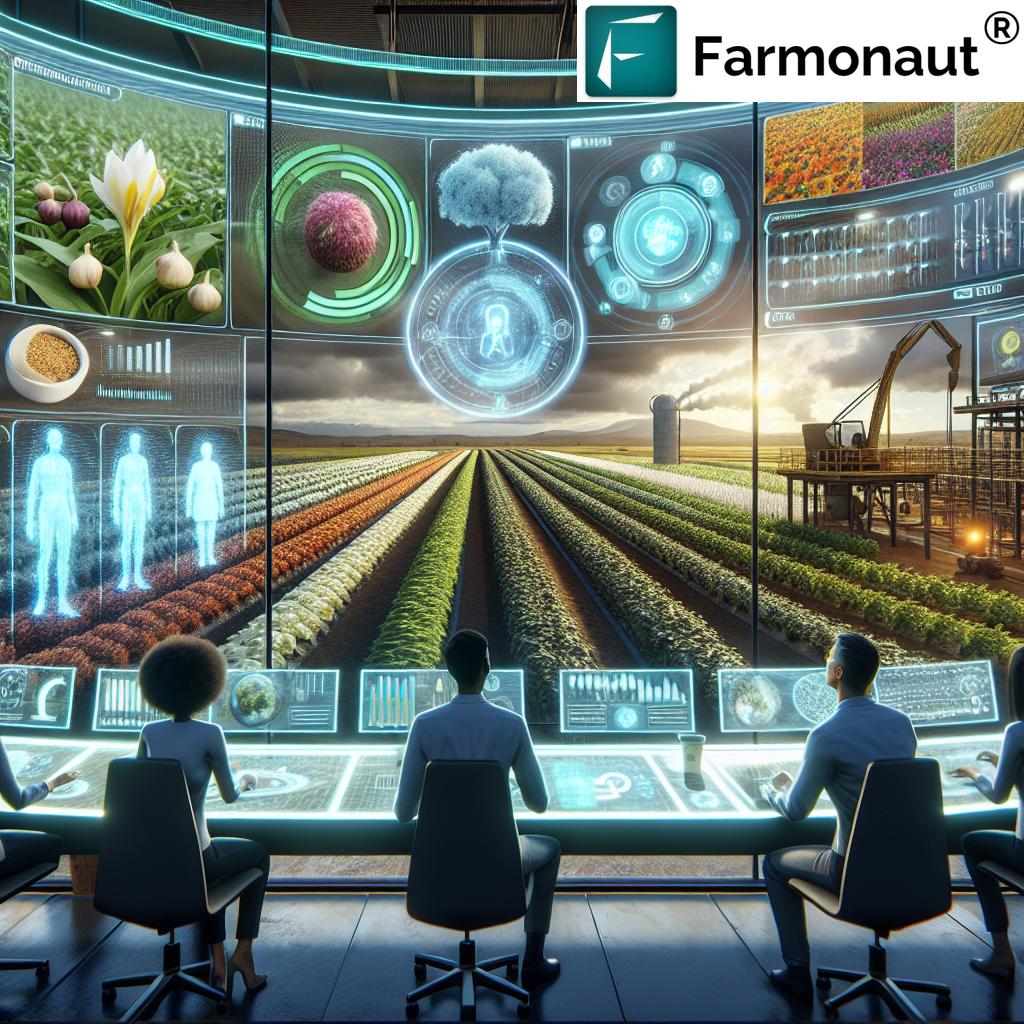
Transforming the Agri-Food Value Chain
The integration of AI and precision agriculture technologies is not limited to the farm; it’s transforming the entire agri-food value chain. From farm to fork, these innovations are creating a more transparent, efficient, and sustainable food system:
- Enhanced Traceability: Blockchain-based systems provide end-to-end traceability, allowing consumers to track their food from the field to their plate, ensuring food safety and building trust.
- Optimized Processing: AI-powered analytics help food processors optimize their operations, reducing energy consumption and minimizing waste.
- Smart Logistics: Intelligent routing algorithms and IoT-enabled tracking systems streamline transportation, reducing fuel consumption and ensuring fresher products reach consumers.
- Data-Driven Quality Control: Machine learning models analyze data from various points in the supply chain to identify potential quality issues before they become problems.
These advancements are not only improving efficiency but also contributing to a cleaner environment and helping Canada meet its sustainability goals.
Farmonaut: Pioneering Agtech Solutions for Sustainable Agriculture
In the landscape of agricultural innovation, Farmonaut stands out as a pioneering force, offering cutting-edge agtech solutions that align perfectly with Canada’s vision for a sustainable and efficient agri-food sector. Let’s explore how Farmonaut’s technologies are contributing to this agricultural revolution:
- Satellite-Based Crop Health Monitoring: Farmonaut’s advanced satellite imagery analysis provides farmers with real-time insights into crop health, soil moisture levels, and vegetation indices. This technology enables precise decision-making for irrigation, fertilization, and pest management, optimizing resource use and maximizing yields.
- AI-Powered Advisory System: The Jeevn AI system developed by Farmonaut offers personalized farm advice based on real-time data analysis. This innovative tool helps farmers make informed decisions about crop management, improving overall farm productivity and efficiency.
- Blockchain-Based Traceability: Farmonaut’s blockchain solution enhances transparency in the food supply chain, allowing for end-to-end traceability. This technology is crucial for meeting consumer demands for food origin information and ensuring compliance with regulatory requirements.
- Resource Management Tools: Farmonaut provides comprehensive tools for fleet and resource management, helping agribusinesses optimize their operations and reduce their environmental footprint.
By leveraging these innovative technologies, Farmonaut is playing a vital role in advancing sustainable agriculture practices across Canada. Their solutions not only benefit individual farmers but also contribute to the broader goals of enhancing food production efficiency and supporting environmental sustainability.
Explore Farmonaut’s innovative solutions:
“Farmonaut’s agtech solutions enable data collection at sub-field level, improving food traceability across 90% of the supply chain.”
Data-Driven Farming: The Foundation of Modern Agriculture
At the core of this agricultural transformation is the concept of data-driven farming. By harnessing the power of big data and advanced analytics, farmers can make more informed decisions about every aspect of their operations. Here’s how data is revolutionizing farming practices:
- Precision Planting: Data on soil conditions, historical yields, and weather patterns guide farmers in determining the optimal time, location, and depth for planting seeds.
- Variable Rate Application: Instead of applying inputs uniformly across fields, farmers can now vary the rate of fertilizers, pesticides, and water based on the specific needs of each area within a field.
- Predictive Maintenance: IoT sensors on farm equipment collect data on machine performance, allowing for predictive maintenance that reduces downtime and extends equipment life.
- Market Intelligence: Data analytics provide farmers with insights into market trends, helping them make informed decisions about crop selection and timing of sales.
By embracing these data-driven approaches, Canadian farmers are not only increasing their productivity but also reducing their environmental impact, contributing to a more sustainable agricultural sector.
Enhancing Food Supply Chain Transparency
Transparency in the food supply chain has become increasingly important to consumers and regulators alike. AI and precision agriculture technologies are playing a crucial role in meeting this demand for greater visibility:
- Blockchain-Enabled Traceability: Blockchain technology creates an immutable record of a food product’s journey from farm to table, ensuring authenticity and facilitating rapid response in case of food safety issues.
- IoT-Powered Monitoring: Smart sensors throughout the supply chain monitor conditions like temperature and humidity, ensuring food quality and safety during transportation and storage.
- AI-Driven Quality Assurance: Machine learning algorithms analyze data from various points in the supply chain to detect anomalies and predict potential quality issues before they occur.
- Digital Product Passports: Each food item can have a digital passport containing information about its origin, processing, and journey, accessible to consumers via QR codes or NFC tags.
These innovations are not only meeting regulatory requirements but also building consumer trust and opening new premium markets for Canadian agricultural products.
The Impact on Agricultural Sustainability
The integration of AI and precision agriculture technologies is having a profound impact on the sustainability of Canada’s agricultural sector:
- Resource Conservation: Precision application of water, fertilizers, and pesticides reduces waste and minimizes environmental impact.
- Soil Health Improvement: Data-driven crop rotation and reduced tillage practices help maintain and improve soil health over time.
- Carbon Footprint Reduction: Optimized farm operations and reduced input use lead to lower greenhouse gas emissions from agricultural activities.
- Biodiversity Protection: Targeted pest management strategies reduce the need for broad-spectrum pesticides, helping to protect beneficial insects and wildlife.
By adopting these technologies, Canadian farmers are not only improving their own operations but also contributing to global efforts to create a more sustainable food system.
Overcoming Challenges and Embracing Opportunities
While the potential of AI and precision agriculture is immense, there are challenges to overcome:
- Data Privacy and Security: As more farm data is collected and shared, ensuring the privacy and security of this sensitive information becomes crucial.
- Digital Divide: Ensuring that small and medium-sized farms have access to these technologies is essential for equitable agricultural development.
- Skills Gap: There’s a need for education and training to help farmers and agricultural workers adapt to these new technologies.
- Initial Investment Costs: The upfront costs of implementing precision agriculture technologies can be significant, requiring innovative financing solutions.
Despite these challenges, the opportunities presented by AI and precision agriculture far outweigh the obstacles. By addressing these issues proactively, Canada can position itself as a global leader in sustainable and technologically advanced agriculture.
The Road Ahead: Future Prospects for Canada’s Agri-Food Sector
As we look to the future, the integration of AI and precision agriculture technologies promises to bring even more exciting developments to Canada’s agri-food sector:
- Autonomous Farming: Self-driving tractors and robotic harvesting systems will become more commonplace, further optimizing farm operations.
- Vertical and Urban Farming: AI-controlled indoor farming systems will enable year-round production of fresh produce in urban areas, reducing transportation needs and increasing food security.
- Personalized Nutrition: AI-powered systems will help farmers produce crops with specific nutritional profiles to meet the growing demand for personalized diets.
- Climate-Resilient Agriculture: Advanced predictive models will help farmers adapt to changing climate conditions, ensuring food security in the face of environmental challenges.
These advancements will not only enhance Canada’s food production capabilities but also open new markets and export opportunities for Canadian agricultural products and technologies.
AI-Powered Precision Agriculture Technologies and Their Impact
| Technology | Application in Agriculture | Benefits | Environmental Impact |
|---|---|---|---|
| Satellite Imagery Analysis | Crop health monitoring, yield prediction | 15-20% increase in crop yields | 10-15% reduction in pesticide use |
| IoT Sensors | Soil moisture monitoring, weather tracking | 25-30% improvement in water use efficiency | 20-25% decrease in water consumption |
| Machine Learning Algorithms | Predictive analytics for farm management | 10-15% increase in overall farm productivity | 5-10% reduction in carbon emissions |
| Drone-based Monitoring | Precision spraying, crop mapping | 30-35% reduction in chemical inputs | 15-20% decrease in soil degradation |
Empowering Farmers with Advanced Tools
The success of this agricultural revolution hinges on providing farmers with user-friendly, powerful tools that make implementing these advanced technologies seamless. Farmonaut’s suite of applications exemplifies this approach:
- Web App: Farmonaut’s web application offers a comprehensive platform for farm management, integrating satellite data, weather forecasts, and AI-driven insights into an intuitive interface. Farmers can access this wealth of information from any device with an internet connection, making data-driven decision-making more accessible than ever.
- Mobile Apps: With both Android and iOS apps available, Farmonaut ensures that farmers have crucial information at their fingertips, whether they’re in the field or on the go. These mobile solutions enable real-time monitoring and quick response to changing conditions.
- API Integration: For tech-savvy farmers and agricultural businesses looking to integrate Farmonaut’s data into their existing systems, the company offers robust API solutions. This flexibility allows for customized applications and seamless integration with other farm management tools.
Explore Farmonaut’s API capabilities:
Farmonaut API
API Developer Docs
By providing these diverse access points to their technology, Farmonaut is ensuring that farmers of all technical skill levels can benefit from the latest advancements in precision agriculture.
The Economic Impact of AI and Precision Agriculture
The adoption of AI and precision agriculture technologies is not just a boon for sustainability; it’s also driving significant economic benefits for Canada’s agri-food sector:
- Increased Productivity: By optimizing inputs and improving yields, these technologies are helping farms become more profitable and competitive in global markets.
- New Job Creation: The integration of advanced technologies is creating demand for new skills in agriculture, from data analysts to drone operators, opening up exciting career opportunities in rural areas.
- Export Opportunities: As Canada becomes a leader in agtech innovation, there’s potential for exporting not just agricultural products but also technology and expertise to other countries.
- Value-Added Products: Improved traceability and quality control enable the creation of premium, sustainably-produced food products that can command higher prices in both domestic and international markets.
These economic benefits are helping to revitalize rural communities and strengthen Canada’s position as a global agricultural powerhouse.
Collaboration and Innovation: The Key to Success
The transformation of Canada’s agri-food sector is not the work of any single entity but the result of collaborative efforts across industry, academia, and government. This spirit of innovation and cooperation is driving rapid advancements:
- Research Partnerships: Collaborations between universities, research institutions, and agtech companies are accelerating the development of new technologies and their practical applications in agriculture.
- Industry Consortiums: Groups like Protein Industries Canada are bringing together diverse stakeholders to tackle complex challenges in the agri-food sector, pooling resources and expertise for greater impact.
- Government Support: Initiatives and funding from federal and provincial governments are helping to de-risk innovation and encourage adoption of new technologies among farmers and food processors.
- International Cooperation: Canada is actively engaging with global partners to share knowledge and best practices in sustainable agriculture, contributing to global food security efforts.
This collaborative approach ensures that the benefits of AI and precision agriculture are widely distributed and that Canada remains at the forefront of agricultural innovation.
Empowering Consumers Through Technology
The impact of AI and precision agriculture extends beyond the farm and processing plant, reaching all the way to consumers. These technologies are empowering consumers in several ways:
- Informed Choices: With enhanced traceability, consumers can make more informed decisions about the food they purchase, based on factors like production methods, environmental impact, and nutritional content.
- Customized Nutrition: AI-powered apps can help consumers choose foods that align with their personal health goals and dietary requirements, leveraging data from the entire food production chain.
- Reduced Food Waste: Smart packaging and inventory management systems help consumers reduce food waste at home, complementing efforts to minimize waste throughout the supply chain.
- Direct Farm Connections: Digital platforms are enabling direct connections between consumers and farmers, fostering a greater understanding of food production and supporting local agriculture.
By involving consumers in the technological revolution of agriculture, we’re creating a more engaged and sustainable food system from farm to fork.
The Role of Education and Training
As we continue to integrate AI and precision agriculture technologies into Canada’s agri-food sector, education and training play a crucial role in ensuring widespread adoption and maximizing benefits:
- Agricultural Programs: Universities and colleges are updating their curricula to include courses on AI, data analytics, and precision farming techniques, preparing the next generation of agricultural professionals.
- Continuing Education: Workshops, webinars, and online courses are being developed to help current farmers and agricultural workers upskill and adapt to new technologies.
- Youth Engagement: Programs aimed at engaging young people in agtech are helping to attract new talent to the agricultural sector and foster innovation.
- Public Awareness: Educational initiatives for the general public are helping to build understanding and support for sustainable, technology-driven agriculture.
By investing in education and training, we’re ensuring that the benefits of AI and precision agriculture are fully realized and equitably distributed across Canada’s agricultural communities.
Conclusion: A Sustainable Future for Canada’s Agri-Food Sector
As we’ve explored throughout this article, the integration of AI and precision agriculture technologies is ushering in a new era of sustainable food production in Canada. From enhancing crop yields and reducing environmental impact to improving food traceability and empowering consumers, these innovations are transforming every aspect of the agri-food value chain.
Companies like Farmonaut are at the forefront of this revolution, providing farmers and agribusinesses with the tools they need to thrive in this new technological landscape. By harnessing the power of satellite imagery, AI analytics, and blockchain technology, Farmonaut is helping to create a more efficient, transparent, and sustainable agricultural sector.
As we look to the future, the potential for further innovation and improvement is immense. With continued investment in research, education, and technology adoption, Canada is well-positioned to become a global leader in sustainable agriculture, setting new standards for food production that balance productivity with environmental stewardship.
The journey towards a fully sustainable and technologically advanced agri-food sector is ongoing, but the path is clear. By embracing AI and precision agriculture technologies, we’re not just improving our food production systems; we’re cultivating a healthier, more sustainable future for generations to come.
FAQ Section
Q: How does AI improve agricultural sustainability?
A: AI improves agricultural sustainability by optimizing resource use, reducing waste, and enabling precision farming practices. It helps farmers make data-driven decisions about irrigation, fertilization, and pest control, minimizing environmental impact while maximizing yields.
Q: What is precision agriculture, and how does it benefit farmers?
A: Precision agriculture is an approach that uses technology to optimize crop management. It benefits farmers by increasing yields, reducing input costs, and improving overall farm efficiency through targeted application of resources based on data-driven insights.
Q: How does Farmonaut contribute to sustainable agriculture in Canada?
A: Farmonaut contributes to sustainable agriculture by providing farmers with advanced satellite-based monitoring tools, AI-powered advisory systems, and blockchain-based traceability solutions. These technologies help optimize resource use, improve crop management, and enhance supply chain transparency.
Q: What role does blockchain play in food traceability?
A: Blockchain technology creates an immutable, transparent record of a food product’s journey from farm to consumer. This enhances food safety, reduces fraud, and allows consumers to make more informed choices about the products they purchase.
Q: How can small farmers benefit from AI and precision agriculture technologies?
A: Small farmers can benefit from AI and precision agriculture by accessing affordable, user-friendly tools like Farmonaut’s mobile apps. These technologies can help improve decision-making, increase yields, and reduce costs, making small farms more competitive and sustainable.





